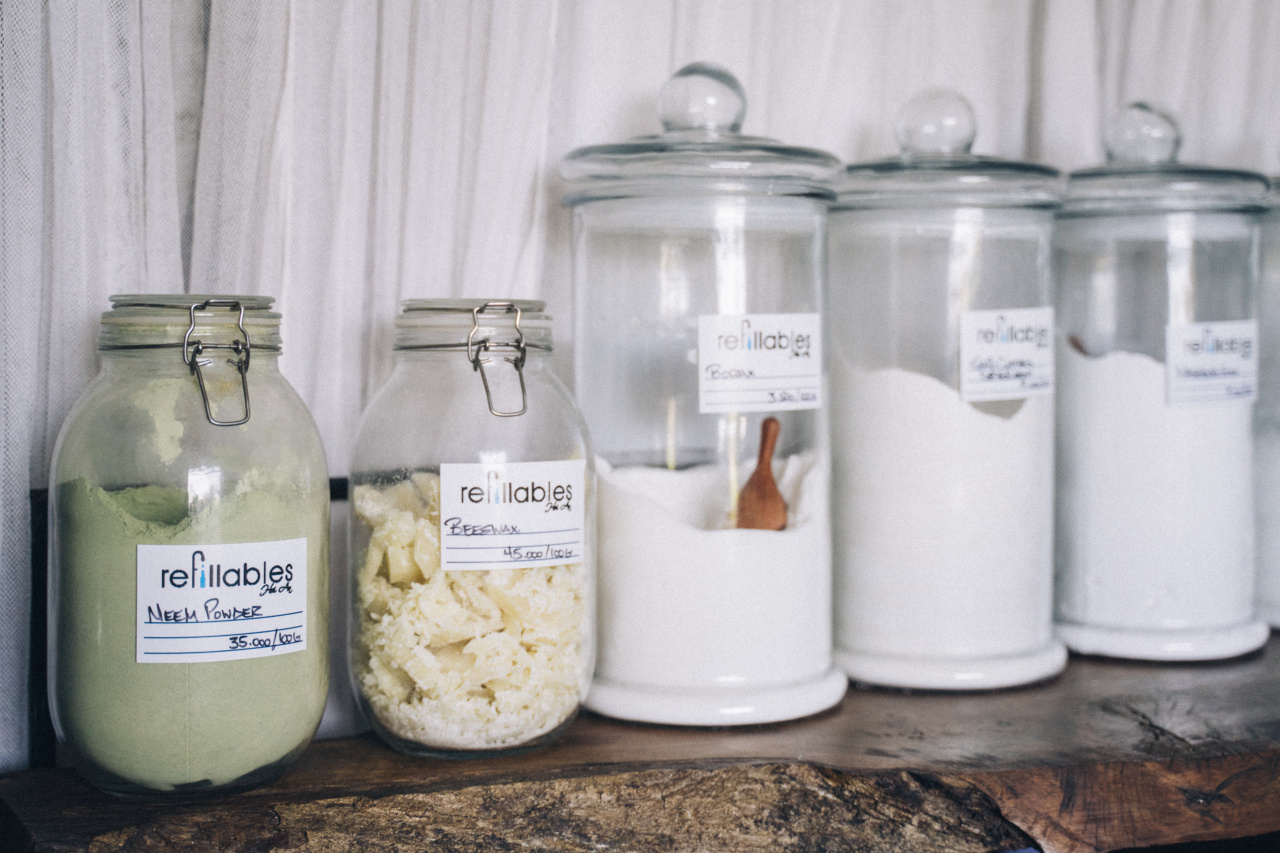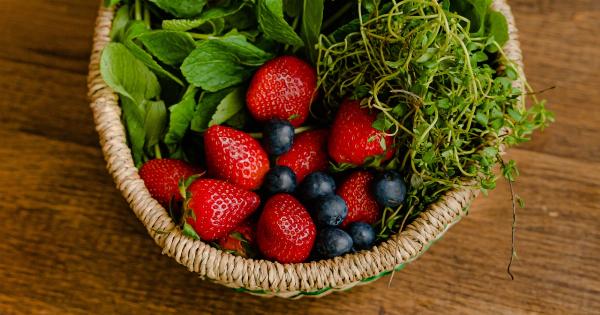Welcome to the world of organic foods, where quality meets sustainability and health. Choosing organic products has become increasingly popular in recent years, and for good reason.
Organic farming promotes a balanced ecosystem, protects natural resources, and offers numerous health benefits. In this article, we will explore why going organic is the way to go and highlight 12 key foods that you should consider prioritizing in your organic shopping list.
The Benefits of Organic Foods
Organic farming relies on practices that nurture the soil and promote biodiversity while avoiding the use of synthetic pesticides, fertilizers, or genetically modified organisms (GMOs).
By choosing organic, you are making a conscious decision to support sustainable farming methods that have a positive impact on both your health and the environment. Here are some of the key benefits of opting for organic foods:.
1. Reduced Exposure to Harmful Chemicals
Conventional farming often involves the use of synthetic pesticides, herbicides, and fertilizers.
These chemicals can be harmful to human health, potentially leading to various issues such as hormone disruption, neurotoxicity, and even certain types of cancers. On the other hand, organic farming prohibits the use of these harmful substances, meaning that organic foods are free from chemical residues.
2. Higher Nutritional Value
Studies have shown that organic foods tend to have higher levels of essential vitamins, minerals, and antioxidants compared to conventionally grown counterparts.
Organic fruits and vegetables, for example, have been found to contain significantly higher levels of vitamin C, iron, magnesium, and phosphorus. By consuming organic foods, you are maximizing your intake of important nutrients.
3. Preserving Biodiversity
Organic farming practices prioritize biodiversity by working in harmony with nature. By avoiding synthetic chemicals and promoting natural pest control methods, organic farms create habitats that support a wide range of plants, animals, and insects.
This helps to protect pollinators such as bees, safeguard native plant species, and maintain a healthy ecosystem for future generations.
4. Environmental Sustainability
Organic farming methods focus on reducing environmental impact. By avoiding the use of synthetic fertilizers and pesticides, organic farming helps to prevent soil erosion, water contamination, and air pollution.
Furthermore, organic farms tend to prioritize sustainable practices such as crop rotation, composting, and water conservation, making organic agriculture an environmentally friendly choice.
5. Enhanced Taste and Flavor
Many organic food enthusiasts argue that organic produce simply tastes better. This could be attributed to the absence of synthetic chemicals, ensuring that the natural flavors of fruits, vegetables, and other organic products are not altered.
If you haven’t tried organic foods before, you might be pleasantly surprised by the enhanced taste and overall culinary experience.
12 Organic Foods to Prioritize
When it comes to organic foods, certain products take the spotlight due to their high pesticide exposure when conventionally grown. To make the most of your organic shopping, consider prioritizing the following foods:.
1. Strawberries
Conventionally grown strawberries are known to have a high pesticide residue load. By choosing organic strawberries, you can enjoy the sweetness and juiciness of this delicious fruit without worrying about harmful synthetic chemicals.
2. Spinach
Spinach is a nutrient-rich leafy green packed with vitamins and minerals. However, conventionally grown spinach can contain high levels of pesticide residues.
Opting for organic spinach ensures that you reap all the nutritional benefits without any unwanted chemicals.
3. Apples
Apples are one of the most popular fruits worldwide, but conventionally grown apples are often subjected to intense pesticide use. By selecting organic apples, you can enjoy their crispness and juiciness while avoiding harmful chemical residues.
4. Tomatoes
Tomatoes are a versatile ingredient in many dishes, but conventionally grown tomatoes can contain pesticides that may compromise their health benefits. Organic tomatoes offer a natural and flavorful alternative, free from synthetic chemicals.
5. Celery
Celery is a crunchy and hydrating vegetable commonly used in salads and soups. However, conventionally grown celery tends to have high levels of pesticide residues.
Choosing organic celery ensures that you savor its fresh taste without consuming harmful chemicals.
6. Grapes
Grapes, particularly table grapes, are often sprayed with numerous pesticides during conventional cultivation. Organic grapes are a great choice to enjoy their natural sweetness while avoiding unnecessary exposure to harmful chemicals.
7. Peaches
Peaches have a soft and juicy texture that many people find irresistible. Unfortunately, conventionally grown peaches are notorious for their high pesticide content.
Opting for organic peaches allows you to indulge in their deliciousness while avoiding synthetic pesticides.
8. Bell Peppers
Bell peppers come in various vibrant colors and are used in countless recipes. However, conventionally grown bell peppers can contain a cocktail of pesticides.
By choosing organic bell peppers, you can enjoy their crunchy texture and natural flavors without worrying about chemical residues.
9. Cucumbers
Cucumbers are incredibly refreshing, especially during hot summer months. Nonetheless, conventionally grown cucumbers can have high pesticide levels, and their waxy skin can trap chemicals.
Opting for organic cucumbers allows you to enjoy their cooling properties while minimizing exposure to synthetic pesticides.
10. Blueberries
Blueberries are renowned for their antioxidant content and health benefits. However, conventionally grown blueberries are often heavily sprayed with pesticides.
Organic blueberries offer a tastier and healthier option, ensuring that you fully experience their nutritional value.
11. Potatoes
Potatoes are a versatile and filling staple in many diets. Unfortunately, conventionally grown potatoes are often treated with numerous pesticides.
Choosing organic potatoes allows you to enjoy their earthy taste while avoiding unnecessary exposure to chemical residues.
12. Leafy Greens
Leafy greens such as lettuce, kale, and arugula are highly nutritious and widely consumed. However, conventionally grown leafy greens can contain pesticide residues.
Opting for organic varieties of these greens ensures that you benefit from their vitamins and minerals without ingesting synthetic chemicals.
Conclusion
Choosing organic foods is a deliberate step towards a healthier and more sustainable lifestyle.
By emphasizing the importance of organic farming, we can support practices that protect the environment, preserve biodiversity, and contribute to our overall well-being. When it comes to shopping for organic products, prioritize foods with a higher pesticide risk, such as strawberries, spinach, apples, tomatoes, celery, grapes, peaches, bell peppers, cucumbers, blueberries, potatoes, and leafy greens.
Incorporate these organic foods into your diet to fully experience their superior taste, nutritional value, and the peace of mind that comes with consuming food free from harmful synthetic chemicals.




























